
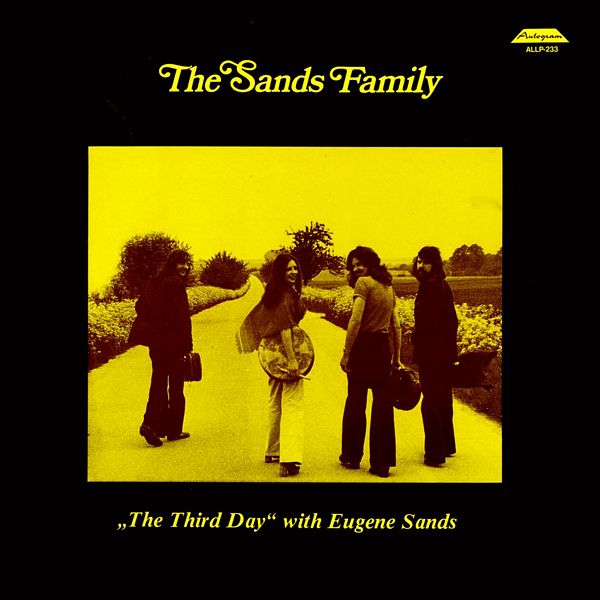 |
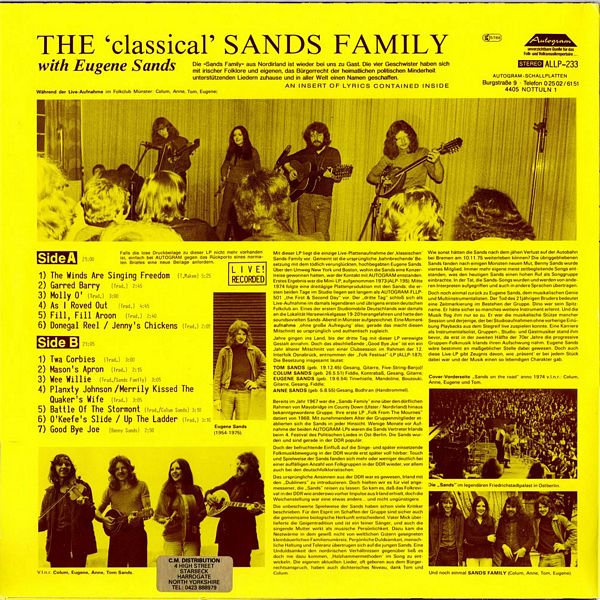
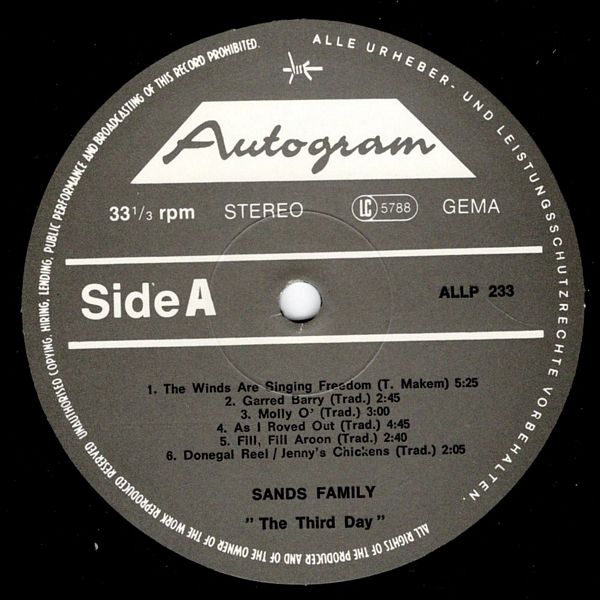
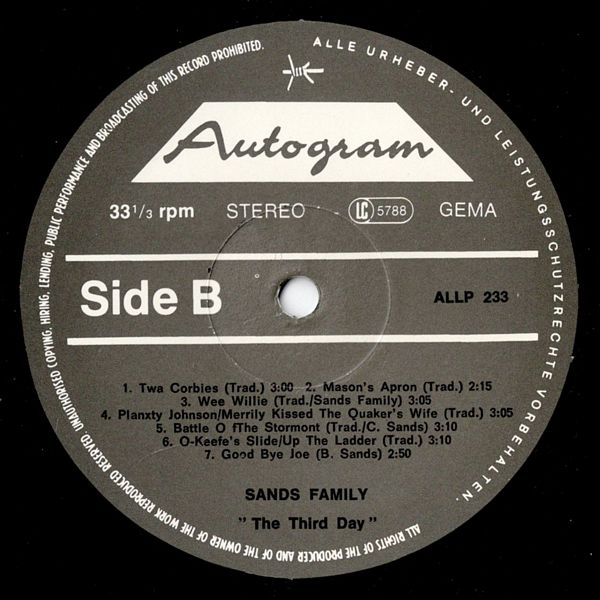 |
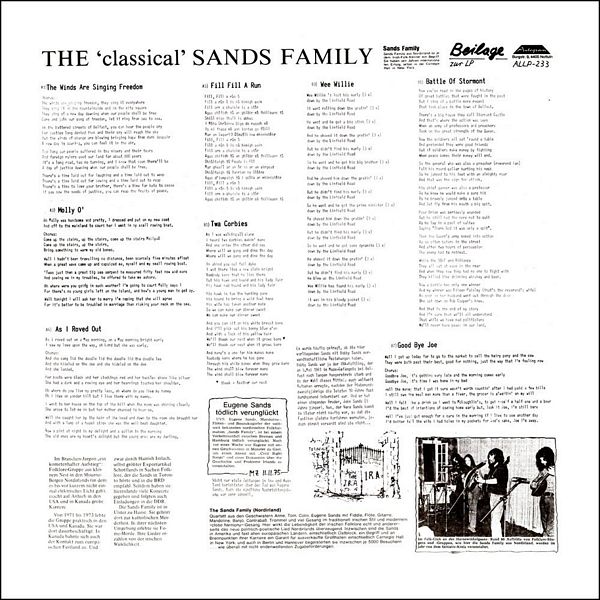
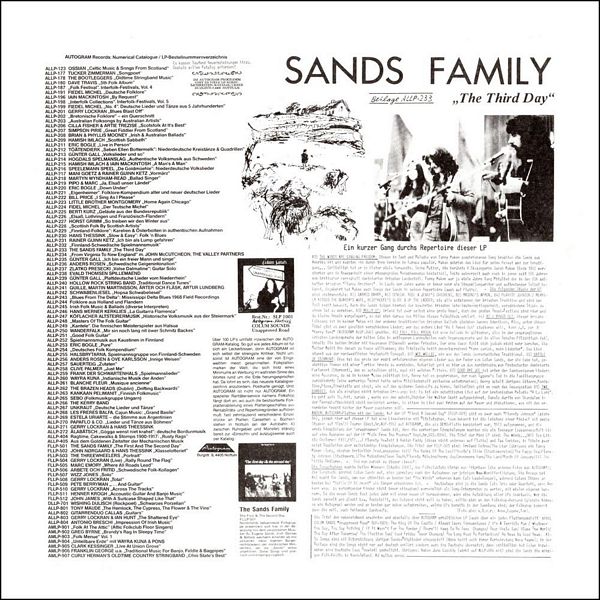 |
Sleeve Notes
"This LP is the 'only' live recording of the 'classic' Sands Family." This refers to the original, "groundbreaking" line up, with the gifted Eugene Sands. These recordings were made during a three-day period in mid-1974, in Germany. The first two days were recorded in the studio and released as The First & Second Day (Autogram-FLLP 501 LP). The "third day" was a live recording at the "legendary" Ührigens German folk club, recorded by one of the first mobile studios in Germany at Harsewinkelgasse 19-20 in Münster.
Sadly, Eugene "Dino" Sands was killed in an automobile accident on autobahn near Bremen, Germany on November 10, 1975, at the age of 21.
THE WINDS ARE SINGING FREEDOM — This song written in lyrics and melody by Tommy Makem brought the Sands from America with them and made them popular with their version in Europe. Makem wrote the song for his homeland and for encouragement … After all, he has many relatives in Ulster. His mother, the famous folk singer Sarah Makem (deceased in late 1982 and buried in the presence of a huge crowd), lived at that time even in that for 800 years dominated by British rule Irish part of the country. Tommy Makem was a member of the US-based Irish "Clancy Brothers" for many years. Over the years, he became known more and more as a singer/songwriter and performing soloist. Conversely, Makem also has songs of Sands in his repertoire (even on record).
GARRED BARRY; DONEGAL REEL & JENNY'S CHICKENS; MASON'S APRON; PLANXTY JOHNSON & MERRY KISSED THE QUAKER'S WIFE, O'KEEFE'S SLIDE & UP THE LADDER are instrumentals. They all come from the Irish tradition and are in part well known. The Sands also follow the well-established Irish minstrels tradition of combining different pieces into a set.
MOLLY O — Although Ireland is itself a big island, there are small islands in front of the big island mainland, so that explains the milieu of this folk song.
AS I ROVED OUT — This Irish folk song is in no way identical to the other traditional Irish ballad of the same name.So, under this title there are two completely different songs; If you want to study the other song 'As I Roved Out', you can to the "Kerry Band" (AUTOGRAM ALLP-266).
FILL, FILL AROON: is a ballad in Gaelic, in the original Irish language of the Celts (which is still common language in remote parts of the country and compulsory in all schools). Content: The two brothers with house names O'Donnell become priests. However, one of them no longer feels called. Your mother then welcomes him home; the title line is accordingly "Come back, my love". The song is from the northwestern county of Donegal.
TWA CORBIES, the only one of its kind not Irish in origin, is a Scottish song on the Breton melody "A La Larc". It goes to the 14th century. back, was recorded by the Scottish poet Sir Walter Scott. At that time, scandals in the ruling class were not allowed to be reported. So sit in the song two crows on the wall and discuss what should happen to the murdered servant behind the wall.
WEE WILLIE a traditional overhauled by the Sands.
BATTLE OF STORMONT — This is the first of Colum Sands' very successful own songs, which has the gift of combining weighty topics with a dose of irony. Of course, this is about the Northern Ireland, Protestant-dominated parliament (Stormont), which has to be dissolved, no matter what the means.
GOOD BYE JOE is an exception among Sands songs because it is in no way political. Benny wrote it, who returned to the family group after Eugene's death (a previous marriage had temporarily interrupted his membership). By the way, Benny plays guitar, mandolin, pipes, tinwhistle and sings, as heard on the later Sands-LPs.
The sleeve notes to this album are in German, above is via google translate.